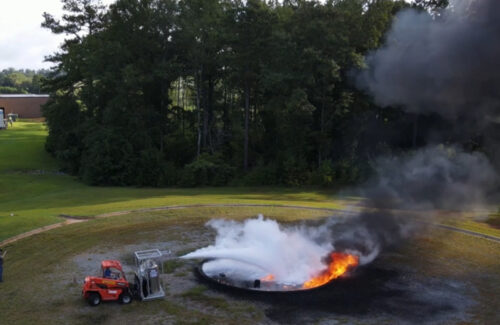A Georgia-based fire safety company has introduced a unique fire suppression system for lithium battery setups. ELSA from Carver Fire is the first fire suppression system that uses dry ice (solid CO₂) to deliver fast, clean, and effective cooling — designed specifically to contain and control lithium battery fires.

A demo of the dry ice suppression system.
Carver Fire says that ELSA is currently deployed at a U.S. battery manufacturing facility, protecting sensitive and expensive production equipment from the potential threat of module fires. By rapidly cooling and smothering battery fires without water, foam or residue, ELSA prevents escalation and minimizes downtime, delivering immediate operational value to customers.
“We created ELSA because battery fires are unlike anything traditional fire suppression was designed to handle,” said Carver Anderson, founder of Carver Fire. “Dry ice rapidly cools without leaving hazmat damage from water or foam behind, making it ideal for sensitive, high-risk environments.”
ELSA is a cryogenic fire suppression system that uses ultra-cold food-grade dry ice pellets. It’s residue-free and does not require water, foam or toxic chemicals. It’s safe for use around lithium-ion batteries, electronics and other critical assets. It has proven performance in lab and field deployments.
Beyond battery manufacturing, ELSA has drawn strong interest from lithium battery recyclers and research laboratories — two industries where battery fires pose a significant risk to both personnel and critical infrastructure. In these environments, the ability to suppress fires cleanly, without toxic smoke, workspace flooding or equipment contamination, is especially valuable.
ELSA is the result of over 35 years of research and prototyping in dry ice fire suppression, now refined into a reliable, field-ready system. As energy storage systems proliferate, ELSA offers a unique solution to the industry’s most pressing fire risk. Carver Fire is actively seeking strategic partners in battery manufacturing, recycling, transportation and R&D environments.
News item from Carver Fire


















